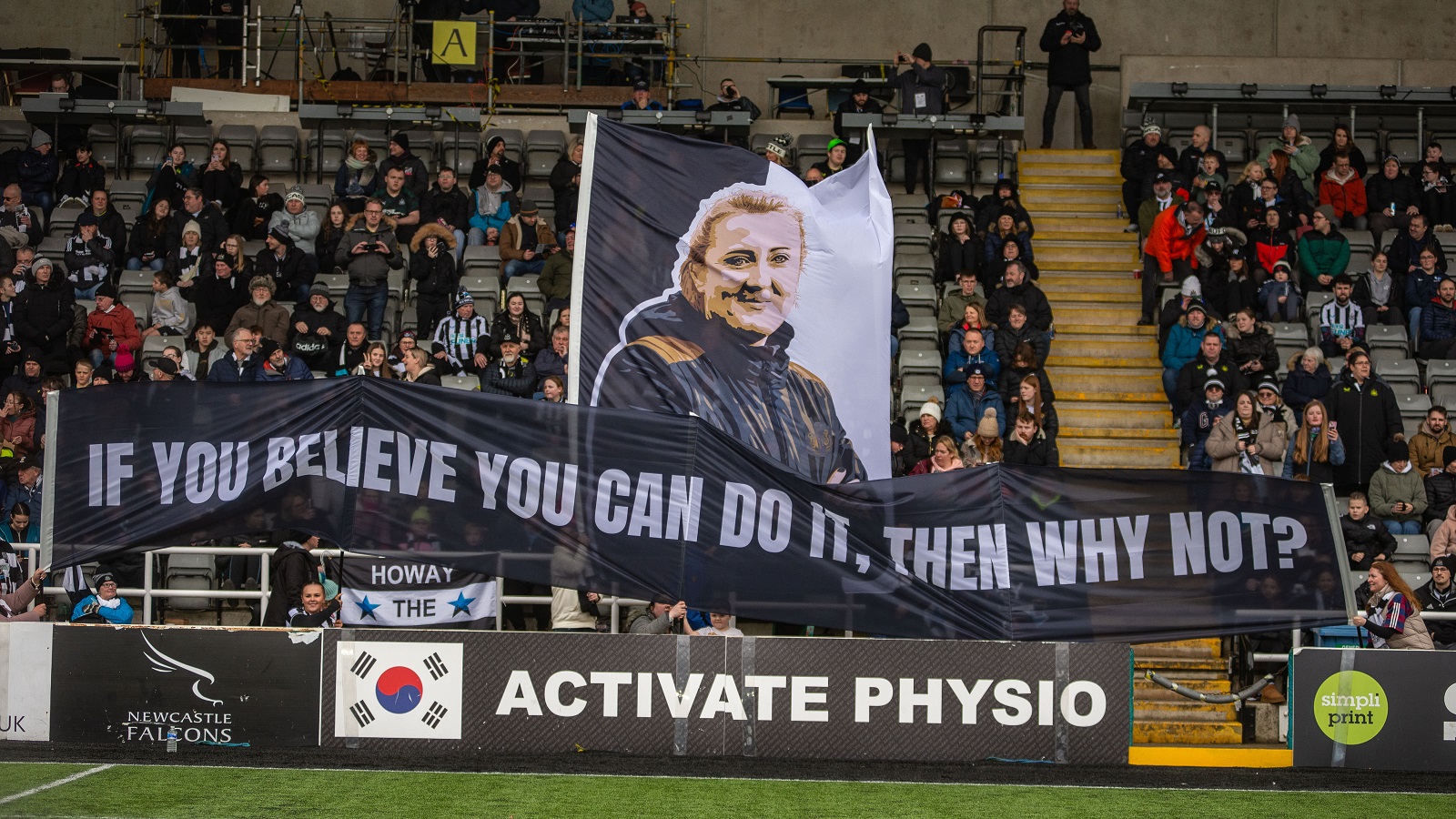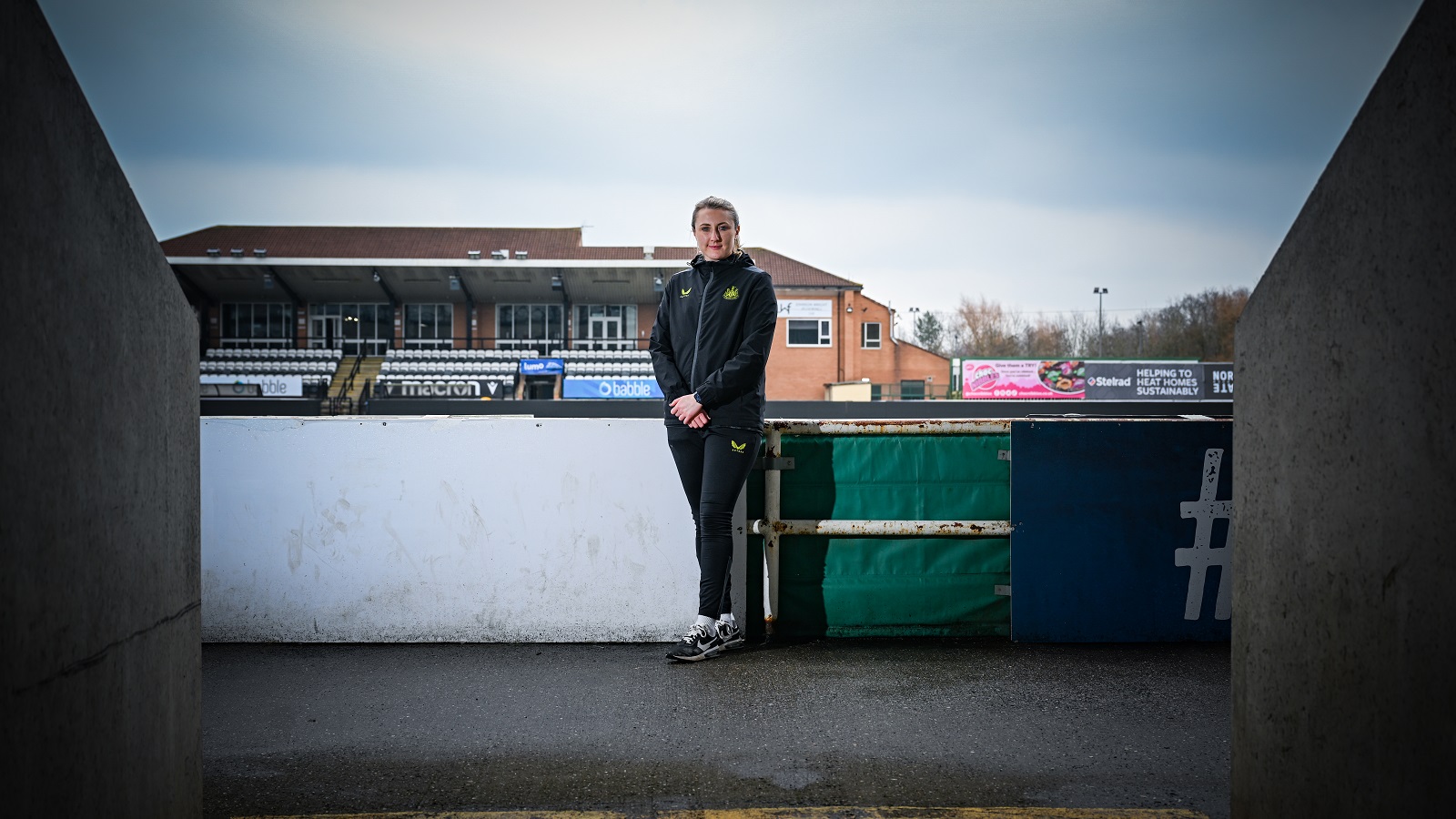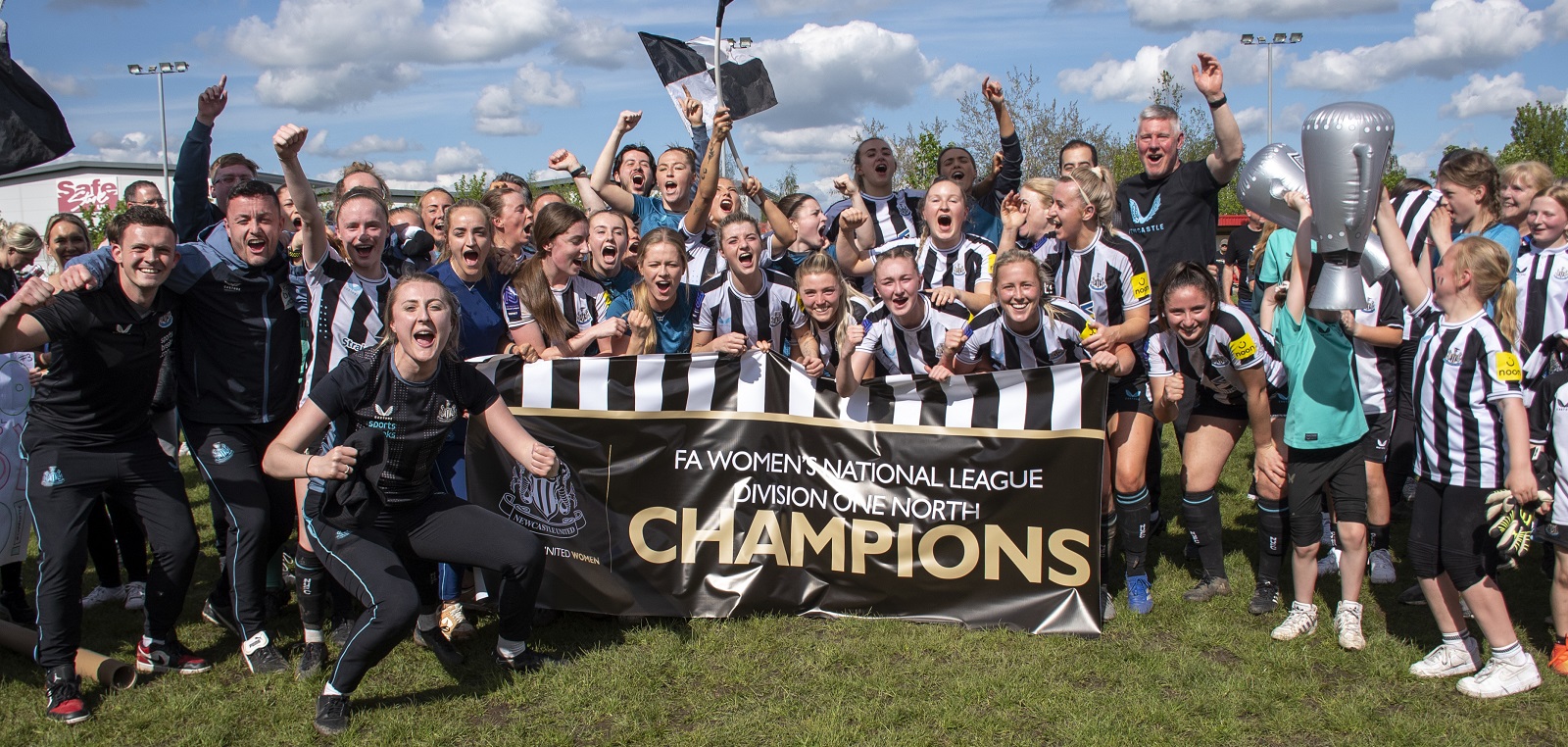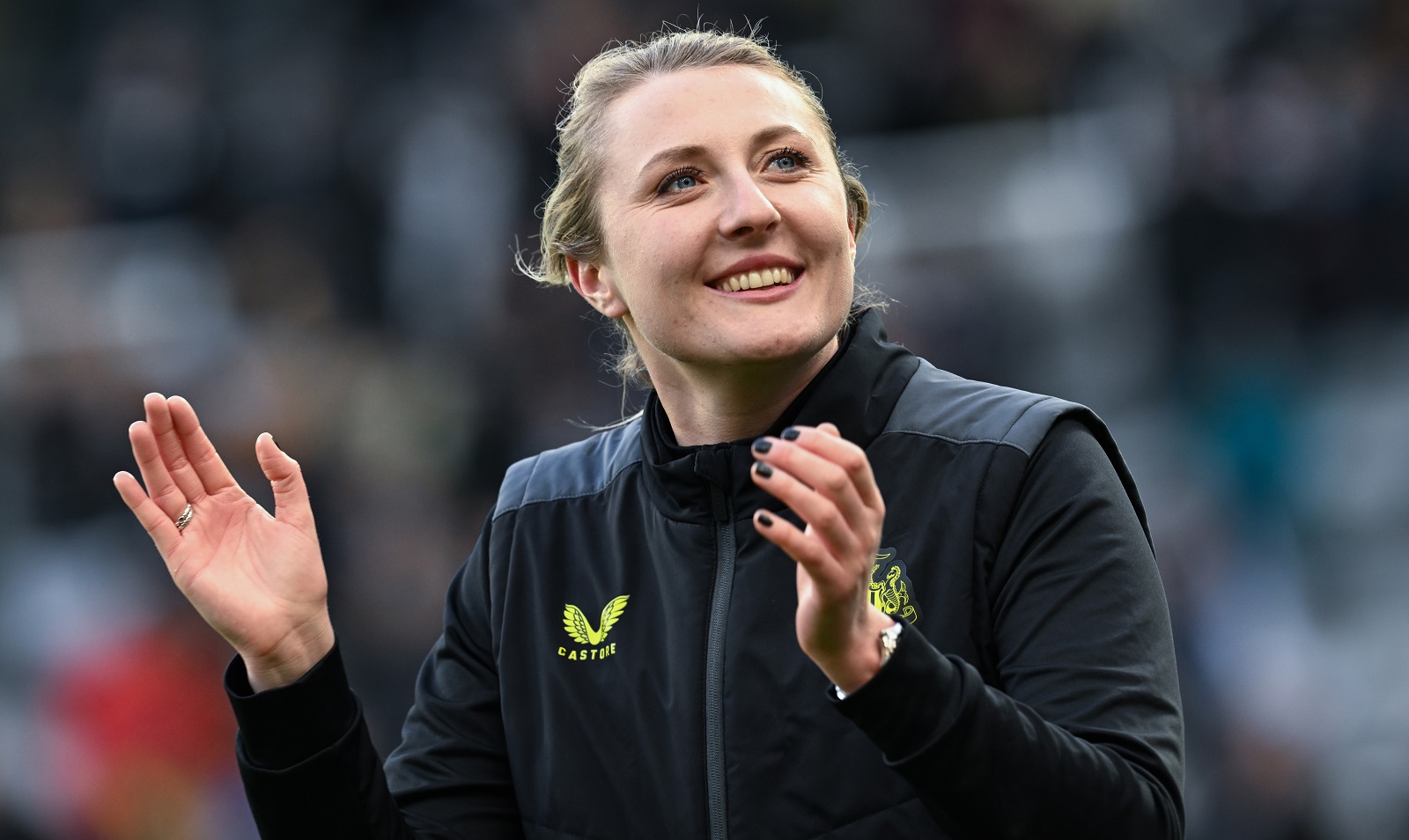Features
Becky Langley: 'We're still asking the same question, and they were probably asking the same question 20 years before that'
Written by Tom Easterby
When Becky Langley saw her own face staring back at her from a flag in the stands, her first instinct was to look for her mum. She was caught between two moments as raw emotion battled the need for focus. "The players saw it before me. When they were waiting in the tunnel, I was coming out of the changing room. They were like, 'have you seen your flag?!' I'm just thinking, 'oh my god', but I'm saying, 'focus on yourselves! Please don't let that distract you!'" she laughs. "But yeah. It's class."
Langley is the head coach of Newcastle United Women and one of the most prominent female sporting figures in the North East. She felt a quiet pride when she clocked that Wor Flags display before their 3-0 win over Wolves at Kingston Park in February but it sat alongside a strange tinge of guilt in her busy mind. What about all the other staff who put the work in, she thought. There is a lot to juggle as the club adjusts to being a full-time, professional one and the effects are felt far beyond the boundaries of the job.
"I almost need to remind myself who's Becky Langley, the football manager, and who's Becky," she says. "How are they different, or are they the same? I'm pretty authentic - I'm pretty much the same in both, or at least very similar in both - but at the same time, obviously I manage people here, so I have to be quite direct. I wouldn't be like that at home."
She is 28 now, a young coach in very different surroundings to those she came into when she took the Magpies job on a part-time basis in conjunction with her role at Northumbria University in 2019. Time is at a premium and that probably won't change. "You have to force yourself to switch off," she says. Days off are spent on her own, or walking her dog on the beach in Tynemouth or Cresswell, working out a good time to switch her phone off or a way to chisel off a bit of headspace that football can't gatecrash.
I ask what makes her happy. She is tempted to just say, 'winning'. "But one of the things I've had a lot of chats about with our club sports psychologist Ian (Mitchell) is not falling in love with the wins. If you romanticise about winning all the time, when you don't win, you're on a massive low. Then there's a hangover from that, in that you don't win the next game. You need to be careful with that.
"It drives you to win, and obviously we haven't lost many games, so in one sense it's great. But at the same time, you can't define your whole happiness from winning and losing football games. But yeah… what makes me happy?" she asks herself with a chuckle. "Winning. That's really bad, isn't it?"
Many would disagree. Langley's side are nine points clear at the top of the FA Women's National League Northern Premier Division with six games left. They are going for back-to-back promotions; last term they won the Division One North title. There is a National League Cup final to come this month. They have set attendance records at St. James' Park and they have attracted a new demographic of supporters that may not otherwise have become invested in the women's game. Langley has been at the forefront of it all.
"It's just… overwhelming. I think it is just overwhelming," she says. "It's good for younger girls in the North East to have female role models, whether that's the players wearing the black and white kit on the pitch, or whether it's me as a female manager in the dugout. I think it's really important."
-
It is a miserable Wednesday and training has finished. Newcastle United Women split their time in the week between Bullocksteads, where they train, and Kingston Park, home of Newcastle Falcons rugby union team, where they meet and eat and analyse and prepare. It is also where their home games are played.
Langley is sitting in one of Falcons' executive boxes on the halfway line, with a view over the stadium's artificial pitch. She was born in Middlesbrough, one of two daughters to Jim and Jane, who were both in the police, and grew up in Ingleby Barwick. Her parents loved football but didn't play or coach. Her sister, Emma, is an economic advisor at the Treasury and had no interest in the sport Langley ended up playing at Middlesbrough Girls' Centre of Excellence.
Her first foray into coaching, she reckons, will have taken place on the Conyers School field when she was about 14, "and I wouldn't have had a clue," she adds. "I'd have just been putting a few cones down and thinking, 'what would I enjoy if I was playing?'" At 15, she began running a session for her teachers on a Friday. "You start to go, 'I quite enjoy this'." She started taking her coaching badges as a teenager before undertaking a sports science degree at Loughborough University.
She played for Derby County and coached alongside her studies and spent a year, unpaid, as a full-time sports science intern at Nottingham Forest, where she worked with the club's under-18 and under-23 men's teams. Matty Cash, Ben Brereton Diaz and Ryan Yates - who she would have a morning chat with about her own games, or other women's matches that had been televised the night before - were among those she has fond memories of working with. The internship led to some further part time work at foundation and youth development level at the City Ground, and gave Langley an insight into the environment and culture of the men’s game.
But despite her experience at Forest, a full-time role in football proved hard to come by. Her dissertation topic in her final year centred on the lack of women's coaches in women's football. "I was 20 or 21 when that was written, nearly ten years ago now," Langley says. "We're still asking the same question, and they were probably asking the same question 20 years before that as well." What conclusion did she draw at the time? "There were lots of reasons. Confidence was a big thing. Having a smaller pool to pick from in the first place due to lack of provision. (And) it being, again, quite a male-dominated environment." She interviewed Shelly Kerr, the trailblazing former Scotland international who was appointed manager of Lowland League men's side Stirling University in 2014, as part of her thesis. "She was probably one of my first female coaching heroes."
Langley became head of women's football at Nottingham University and worked for Physiolab Technologies for two years, combining her sports science background with business and sales. She travelled to Australia to support Team England and aid their use of her company's equipment at the 2018 Commonwealth Games. Alongside her evening work at Forest, it proved taxing. "I would coach 7am to 9am. I would then quickly get out my tracksuit, get a shower, put my normal work clothes on, work nine to five in my job at Physiolab, then at six I would put my other tracksuit on and go and coach at Forest until nine. It was quite an unhealthy lifestyle, I have to say, but it was making ends meet with those three jobs, and learning a lot in a short space of time."
In 2019, a job at Northumbria University - head of women's football - came up. It was a chance to be closer to home. Part of the role involved spending eight to ten hours a week running Newcastle United Women, as part of a partnership with Newcastle United Foundation, the charity under whose banner the team operated. Apart from Langley, players and staff were effectively volunteers with other jobs who would turn up at the club’s academy twice a week for training in the evenings - "the graveyard shift," she smiles. "It was like, 'don't come through the gates until 7pm when everyone's left and then you're fine - but you need to be gone by half nine'." Matches were played at Druid Park, often after children's rugby games had taken place there hours earlier. "The Fruit Shoots and stuff would be in the dugouts, the changing rooms needed a lick of paint, everything was just very basic. Players would be eating chips and having a pint after the match, so I was like, 'woah - all of this needs professionalising completely'. But everyone was playing for free, playing for fun." Or paying to play? "Yeah - the players had to get a sponsorship every year, so they'd have friends or families with businesses who would pay £300 for the season, or maybe more. There were a couple of players who couldn't find a sponsor at the time, so genuinely, they paid on direct debit every month, just to play."
The sponsorship money barely covered the kit required. Langley's mum and sister would man the gates at Druid Park, collecting small change. It feels like the distant past but she points out that this was less than four years ago. "I just knew that regardless of the resources, we could still win. I wasn't thinking, 'I really hope one day the club puts money into this'. I thought even if we've got to do it on a shoestring, we can still be good enough to win, by getting the right people in and out of the club. We've recruited well across the years."
Langley brought in players she knew from Northumbria, like Georgia Gibson and Katie Barker, and jettisoned others. Gradually a spirit was forged on long journeys to and from matches on a Foundation minibus, with balls and cones and boots crammed under seats and in the footwells. Sometimes, for Langley and others who played for both Northumbria and Newcastle, there would be two games in one day in disparate locations.
After winning promotion from the FA Women's National League Division One North in 2023, a year after a restructuring saw the women's team brought under the club's ownership for the first time, a crossroads was reached. Players had to be released and recruited amid an uncertain background as it was debated whether Langley's side would become a full-time professional outfit. Two offers - one full time and one part time - were made to targets (before it was confirmed they would definitely become full time last June). The stakes are high, with some players effectively on career breaks. Langley cites the example of Gibson, a staple of their title winning team who also held down a stable job as a PE teacher at Newcastle School for Girls last term. She signed a one-year professional deal with the club in the summer and Langley wants her to stay beyond this season, but is mindful that football often offers less security than real-world employment.
Such realities can get lost somewhere in the dream. Players at the equivalent level in the men's game rarely need to make such choices. It creates a curious dynamic and Langley is in a unique position. She can inspire others to pursue their ambitions and but simultaneously has the power, and indeed the responsibility, to make decisions that can crush aspirations or at least halt them as the club progresses at pace. How do you balance that? "I guess what we say is that, for example, we've played 70 per cent of the games already. We've got 30 per cent of the games to go. We've done really well, we're top of the league at the minute, but if we don't win those 30 per cent, the rest of the games, then we've achieved nothing.
"But then, in the balance of that, we achieve something every single time we play, because we're inspiring people that are coming to watch. It's a fine balance and it has helped take the pressure off us quite a lot. Yes, we play to win, obviously. But at the same time - forget about winning for a second - every time we go out there we give absolutely everything, live and breathe our values, so that people can be proud of what they're watching and see role models out there. If we lose a game, fine - you're not going to win every game - but as long as you're inspiring people who come to watch, then that's great."
Langley, who speaks with an appreciable Teesside accent, says she is a natural straight talker. "Because I'm competitive and I don't like pretenders," she nods. "That's a good way of putting it." She feels players respond to her style. "The proof is in the pudding and they know what they get from me back. They know they'll get someone who's hardworking, committed, passionate, wants the team to win – but won't win at all costs by compromising what we believe in. I think players buy that."
There is an acknowledgement that for all the leaps made off the pitch in the last few years, results will provide the lens through which that progress is viewed. They have full time staff now and expert support in all areas, backed by an encouraging ownership. The Magpies have a pull and it comes with pressure but internally it was decided that their main goal for this season was not to win the league - an outcome many external observers would shrug at and expect - but to adequately adjust to being full time. Langley said recently that her and her staff were learning on the job and adapting to that transition, looking for consistency in a sport where transience is the norm. She talks of her close relationship with co-owner Amanda Staveley, of a need to progress and to make sure their season doesn't go to waste, but of the need to have fun too.
"I think people think football is fun, and it is fun - winning games is fun, special moments like playing at St. James' and seeing yourself at the top of the league is fun," she says. "But being an elite player, whether that's in men's or women's football or in any sport, comes from really boring, consistent behaviours, all day long, and in your life away from here as well. It's not all glamour."
There has been some 'glamour' - four successive 22,000-plus crowds at St. James' Park, a 399-day unbeaten run which lasted until January and a cup final against Hashtag United at Kenilworth Road later in March - but these achievements have come against the backdrop of rising misogyny in football. Last summer, a Women in Football survey found that 82 per cent of its members reported that they had experienced some form of discrimination - defined as "sexism, sexual harassment and derogatory comments on ability based on gender". Of that 82 per cent, only 23 per cent felt able to report it.
Langley doesn't necessarily feel she has been discriminated against but she says has been in environments where the "dated" views of "dinosaurs" pervaded the atmosphere. "There was always that, 'is she capable enough to do this because she's a woman' type of thing," she says. She has heard unacceptable comments, not directed at her but in her and others' presence. "It would be like, 'get up you *****', 'you're a ******, you need to do X, Y and Z'. In the gym, there'd be, like, 'you're lifting like a lesbian – you need to lift heavier'."
She says she has been in situations where she would feel she had to pretend not to have heard what was said, or awkwardly look away, which she would now challenge. She feels there are "key barriers" and "common themes" in sport, one of which being a poor general understanding of female health and issues such as menopause. Pregnancy and the hormonal changes it brings is another. "For example, we've got a player in our team, Nicki Gears, who is a mum - she gave birth six months ago. She's returning to football now so she's not 100 per cent fit and back playing, but we need to have an environment that accommodates a baby coming in, or her parents or childcare coming in and out to look after the baby.
"Another huge barrier is females feeling listened to in male-dominated environments, whether that's women's or men's (football). I've got colleagues in different areas who've referred to people - men - overpowering them in meetings and not listening, or them feeling like they have to work twice as hard because they're a woman, or a female being in a senior position and people asking the advice of someone not as senior - but because they're a guy, they trust their opinion more.
"There's lot of barriers like that that are there. Sometimes it's the subtle things which people don't get. It's not necessarily, 'you can't be in this meeting because you're a woman', or, 'you can't be employed here because you're a woman'. But when that actually happens, environments adapting to what that actually means I think is really important."
There is also the more overt sexism that has received plenty of public attention in recent months. "It's mad, isn't it," Langley laments. She feels part of the solution lies in education around what is and isn't acceptable and says that her team, led by captain Amber-Keegan Stobbs and their leadership group, is self-policing in that respect. How has she viewed the recent discourse around these issues? "I think it's draining, but not surprising," she replies. "A lot of stuff that's come out in terms of how male staff have treated female players in environments, I'm not surprised by any of it, because I've seen it the whole time I've been playing football. There's not enough people actually calling that out and it's because people are scared, because they don't want to outwardly challenge that on social media, because, 'it's the reputation of where I'm working and my role'. But at the same time, it needs more people challenging it, because otherwise it's just going to continue."
There will be other factors as to why people don't feel comfortable coming forward with their experiences. Langley points out that a lot of women's football clubs still operate in unprofessional conditions, with volunteers, players who pay to play, inadequate safeguarding provisions and staff who lack education on key issues. There will be women in the game, she says, who are "putting up with stuff like this all the time".
-
Not long ago, Langley explained in an interview that she had to "keep reminding myself to be empathetic towards myself too". I wonder how adept she is at that while spinning many plates. She smiles. "Something one of the players said to me the other week was a saying: 'put yourself in people's shoes, but remember to keep your socks on'. I thought that was really interesting. It's understanding how they feel, but also, you're not them, so you have to see things through your lens.
"I don't give myself too much of a hard time. I know what I'm good at, I know what I need to work on. I'll be accountable. If we don't win a game, the first person I'll be looking at is me, not the players. Then we'll unpack it together, as it's a team sport.
"In terms of me and my own wellbeing, I will on days off think about what I need to do to look after me. But sometimes you can't. You've got family and stuff to be thinking out as well. But little things to wind down, going to the coast, having fresh air, going out for tea, doing something nice... it's good to chill out as well."
You get the sense that more introspective questions fall outside of her comfort zone. In a piece with The Athletic last month, Su Cumming, the Magpies' head of women's football, said Langley was in possession of "the hard edge, the soft touch, the vision". The last part aligns with the club's and the soft touch is evident in pastoral dealings with players and staff, she replies. The hard edge is more intriguing. "When I'm driving people to be better, I'll be brutally honest with them. If I don't think they’re acting in our environment in the right way or living and breathing our values then I will hold them accountable for that. I literally don't care who they are – I'll tell them straight," she adds. "I try and understand, but equally, we're not here for fun. We're here to win." She says it's the same with staff, and that everyone has choices to make. "When you go part time to full time, you will lose some people on the journey, because they can't transition quickly enough. But it would be absolutely the same with the men's environment. If you're not the best, you won't work here."
She feels - knows - that there is lots still to come at Newcastle and it is a sign of both confidence and conviction that their target of reaching the Women's Super League is a public one. But it is also reasonable to think that the real reward for what Langley and her team are doing now may not be fully apparent for some time. Trophies are sought but the impact of their work on her team's supporters, in becoming idols for young girls to follow in a boomtime for the sport, is likely to be just as significant.
"I get quite a lot of mums who'll be like, 'my daughters are so into football now - they love it. They go to the game with their dad, and they never really had that bond before until they started coming to Kingston Park to watch the games', which I think is nice. Even little boys, when (their parents are) like, 'my son's really into women's football now - they're not seeing it as men's and women's football, they're just seeing it as football'. And they enjoy coming."
Langley is reminded of an illustrative interaction she had with an elderly man last year. She went to St. James' Park for a Memory Café session, a drop-in event for supporters with life-changing illnesses like dementia and Alzheimer's, during which she gave a speech to the group and mingled as attendees sipped their teas and ate their sandwiches. One man, who was there with his wife and friend, told Langley that having heard her speak, he quite liked the idea of coming down to watch the women's team play.
He turned to his friend and suggested they went along to a game at some point. His friend didn't say much in response, and the husband and wife later got up and left. Langley sat down next to their friend. He leaned in. "He said, 'your number nine's decent'," before offering a rather more robust assessment of another player. Langley is laughing. "He was too embarrassed to tell his friend and his wife that he comes!" she says. "I just found it hilarious. At the same time, I was like, 'that's mint - you're a fan, and you're just telling it how it is'. It's the demographic. This was an 80-year-old man who comes on his own because he's lonely, and then you've got nine-year-old kids who come with their other friends from football. It's just great."
Friday, 8th March is International Women's Day 2024. For more information, please visit internationalwomensday.com or for more details on Newcastle United's work around diversity, inclusion and welfare as part of the United As One campaign, please click here.
